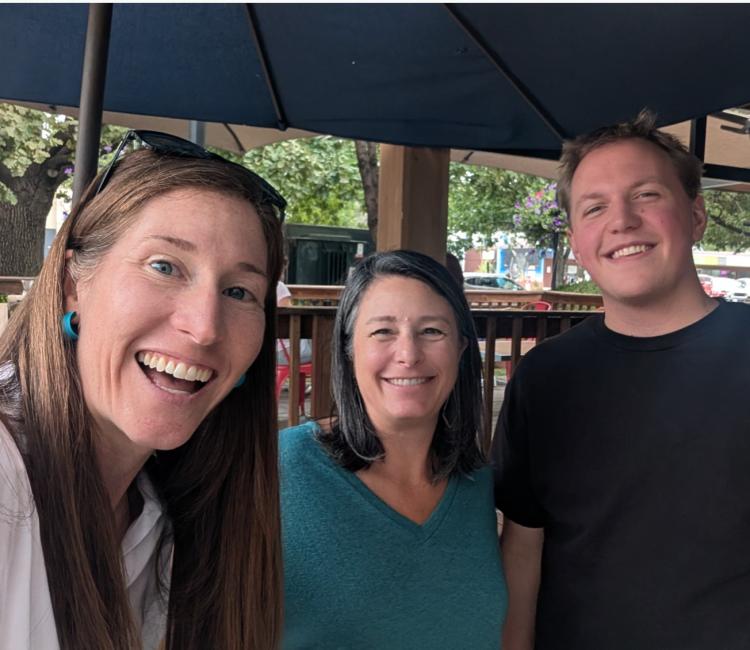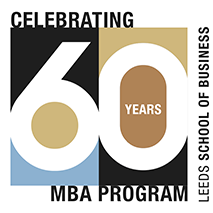Student Spotlight: CESR Impact Intern Charlie Tell

Charlie Tell with his summer internship managers at Greenhouse Scholars
This summer, CESR’s Impact Internships program supported Leeds student Charlie Tell to take an internship with a mission-driven nonprofit making real change. The program provides a $7,000 stipend to Leeds undergraduates who use their business skills at a registered 501c3 for the summer. Charlie, a senior studying Leadership and Management, interned this past summer at Greenhouse Scholars - an education-focused nonprofit supporting students from under-resourced backgrounds. Through the program, Charlie gained new insight into how nonprofits operate, how business skills translate into meaningful impact, and how his values continue to shape his journey.
Could you tell us about Greenhouse Scholars and what kind of work you did this past summer through the Impact Internship program?
“Greenhouse Scholars helps out in communities that are under-resourced or below the poverty line. They provide resources like educational development, scholarships for college, and workshops that help students with how to be a leader in the workplace. This summer, I worked with Greenhouse’s business practices, including a lot of work in Salesforce and Excel to try to automate a lot of the current systems, which needed work because of the nonprofit budget. By the end of the year, I got to work on the logistics of the Summer Symposium, which is the final, biggest gathering of the year for donors, scholars, and everyone to come to Boulder and learn more about what exactly the program does.”
What did you learn about working at a nonprofit organization, and how did the Impact Internship Program influence that experience?
“Probably the biggest takeaway from the whole experience was realizing how viable nonprofits can actually be. I always pictured nonprofits as tiny operations - someone working out of a closet with two employees and no money. But Greenhouse was a pretty big organization. They had around 30 full-time employees, all making solid wages, and they had steady funding from donors. It completely changed my perception of what a nonprofit can look like.
Also, the people working there were amazing - very impact-minded and genuinely passionate about what they were doing, which I really appreciated.”
What are some of the biggest challenges you think should be solved in the world right now, and how do you see business playing a role in the solution?
“I work during the school year in the education space for a company called Untapped in Broomfield. We train kids on executive functioning skills - planning, organization, and the things you need to succeed in school that usually aren't taught. Most of the students we work with are neurodiverse.
One thing I’ve noticed, especially with the rise of AI, is that the education system isn’t keeping up. AI is changing how students learn, and honestly, it feels like education needs a full rehaul to adapt to this shift.
In the U.S., most education is through public systems, so there’s not much room for business involvement within schools. But I think businesses can still play a big role outside traditional schooling - like what we do at Untapped. We’re not government-funded, but we still make an impact in the education sphere. I think there’s a lot of future potential for business solutions in education.”
Outside of academics and work, what personal experiences or influences have shaped the way you think about sustainability or education, and led you to pursue this opportunity?
“A big influence on who I am is the fact that both of my parents are psychologists. Growing up, I was taught to think deeply about my morals and the kind of person I want to be. That led me to study leadership and management at CU Boulder after moving from Ohio.
I’ve always been curious about people and what makes them who they are, which is why I gravitate toward education and leadership. Outside of school and work, I’m constantly surrounding myself with information about those topics. I think it’s helped me build empathy and think more about how I can make an impact in ways that go beyond just earning a paycheck.”
What advice do you have for current or incoming students?
“I’m a senior now, and when I started, I had the same picture everyone has about business school - land an internship at a big firm, get a return offer, and go down that corporate path.
But through my time with CESR and my internship last summer, I’ve learned that’s not the only route. There are so many other viable ways to build a career and find work that actually brings you joy - not just a paycheck.
So my advice is: don’t let the “typical” picture of success block you from finding a version of success that actually fits you.”
Charlie’s experience is a reminder that careers in business don’t have to follow a single path, and that meaningful work often sits at the intersection of purpose and practical skills. The Impact Internship program provides an unrivaled opportunity to make a real impact while eliminating the main roadblock in the nonprofit industry.
Applications are now open for students to express interest in the Impact Internship program for Summer 2026. Learn more.







